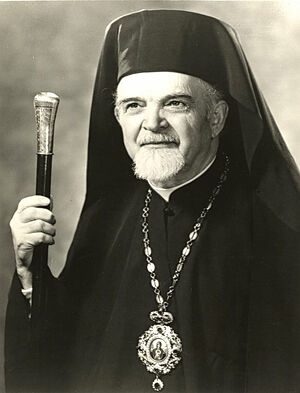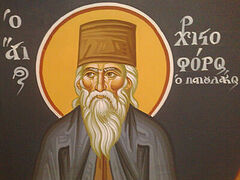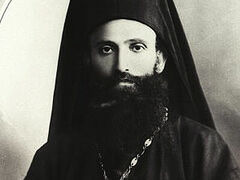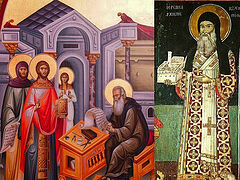Fresno, California, October 13, 2023
 Photo: http://full-of-grace-and-truth.blogspot.com/ The Holy Eparchial Synod of the Greek Orthodox Archdiocese of America (GOARCH) has petitioned the Holy Synod of the Patriarchate of Constantinople to canonize a hierarch who labored for many decades in America.
Photo: http://full-of-grace-and-truth.blogspot.com/ The Holy Eparchial Synod of the Greek Orthodox Archdiocese of America (GOARCH) has petitioned the Holy Synod of the Patriarchate of Constantinople to canonize a hierarch who labored for many decades in America.
His Grace Bishop Athenagoras of Nazianzos spoke about this at the recent GOARCH Monastic Synaxis that was held at the Monastery of the Theotokos the Lifegiving Spring in Fresno, California. (one of the many monasteries founded by the holy Elder Ephraim).
According to the communiqué following the three-day event:
His Grace Bishop [Athenagoras] of Nazianzos updated the Synaxis on the saintly life and character of the late Bishop Gerasimos of Abydos, including the progression of the request the Holy Eparchial Synod forwarded to the Ecumenical Patriarchate with regards to his canonization.
His Grace Bishop Gerasimos (Papadopoulos) of Abydos († 1995) was an Athonite monk and later a titular bishop of the Patriarchate of Constantinople who labored in the United States for the last four decades of his life. He served in both Boston and Pittsburgh, but is most warmly remembered as a professor and spiritual father to countless students at Hellenic College-Holy Cross Greek Orthodox School of Theology in Brookline, Massachusetts.
Even as a bishop, he lived simply in a dorm room and always made himself available to share his spiritual wisdom with the students.
He reposed on June 12, 1995, from complications following heart surgery.
A conference was held at Holy Cross in October 2021 in honor of the 25th anniversary of Bp. Gerasimos’ repose, which included the premier of the documentary Bishop Gerasimos of Abydos: Spiritual Elder of America:
***
His life from Orthodox Wiki reads:
Early life
Gerasimos was born Elias Papadopoulos on October 10, 1910, in the town of Bouzi (today called Kyllini) in the province of Corinth. His parents were Ioannis and Athanasia Papadopoulos. The fourth of ten children, Elias was marked early in life as having a sober and serious disposition. In elementary school, he was nicknamed "Pappou" (grandfather) by his schoolmates. He left school at age thirteen and took a series of jobs in business, including grocer's assistant, shoemaker's apprentice, and worker in a forge.
In 1928, Elias became a novice in the monastery of Mega Spelaion. Within two years he had moved to the Skete of St. Anna on Mount Athos. He placed himself under the spiritual supervision of Monk Chrysostomos (Kartsonas), and was respected by the elders of the skete for his virtue and prudence. It was here that he was tonsured a monk and took the new name of Gerasimos. He left the skete in 1934 with the blessing of his elder to undertake studies at the Theological Seminary of Corinth. In June of 1935, on the feast day of the Holy Spirit, he was ordained to the diaconate by Metropolitan Damaskinos of Corinth. He entered the School of Theology of the University of Athens in 1938, but his studies were interrupted by the German invasion of Greece in 1940.
Priesthood
Gerasimos was ordained to the priesthood in May of 1941 by Metropolitan Michael of Corinth. Damaskinos, now Archbishop of Athens, appointed Gerasimos as director of the orphanage of Vouliagmeni. He held this position through the remainder of the war and the occupation of Greece, following which he agreed to become Chancellor of the Metropolis of Corinth in 1945. In 1947, he relocated to Germany, where he served as proistamenos of the Greek Orthodox church in Munich. It was during this service that he completed his first book Greek Philosophy as Propaideia to Christianity.
America
Following one year of service as chaplain to the student dormitory of Apostoliki Diakonia, Gerasimos arrived in the United States in 1952 to become Professor of New Testament at Holy Cross Greek Orthodox School of Theology, Brookline. His former Metropolitan, Michael, had been elected Archbishop of North and South America four years earlier, and sought to have his former Chancellor with him. He was eventually appointed sub-Dean, but ran into conflict with the Dean, Fr. Ezekiel (Tsoukalas), who removed him from the position. Nevertheless, he developed a strong bond with the students, who gave him the nickname "Fr. GULF." ("Gerasimos - Understanding, Love, Faith) in recognition of the topics he discussed avidly with them. Meanwhile, he undertook advanced studies at Boston University, where he received the degree of Master of Theology. Concurrently, he was invited to speak and give retreats throughout New England and in other forums throughout the United States.
Episcopacy
On April 6, 1962, the Holy Synod of the Ecumenical Patriarchate elected Gerasimos as titular Bishop of Abydos. He was initially assigned to oversee the Third Archdiocesan District, based in Boston. In 1967, he was transferred to Pittsburgh and the Sixth Archdiocesan District, where he remained until retirement in 1977.
Upon his retirement, Bishop Gerasimos contemplated returning to Greece, but after a short stay he accepted an invitation to return to Boston and Holy Cross Seminary as a professor. Of greater significance was his role as spiritual father in residence. He lived simply, in one of the dormitories and made himself available to counsel the students and share spiritual wisdom. The bishop was deeply respected by the students and by the larger community in Boston as an Abba, a source of spiritual advice and strength. His nephew, Dr. Stylianos Papadopoulos, recounts an incident in the book Agape and Diakonia: Essays in Memory of Bishop Gerasimos of Abydos that examplifies the reputation acquired by the bishop:
The visit of Bishop Gerasimos to the Holy Mountain coincided with the feast day of the main church of the St. Anna Skete. As a bishop of the Ecumenical Patriarchate and a former monk of Mt. Athos, a few of the old monks who remembered him, particularly the monks of Fr. Chrysostomos Kartsonas, naturally, wanted him to celebrate the Divine Liturgy at the great festival of St. Anna. Bishop Gerasimos, however, because he had been living in America had a short, trimmed beard. This prompted some of the monks of the Skete to oppose his liturgizing because, they claimed, the people would be scandalized seeing him with a trimmed beard. When they clearly intimated their perplexity over this matter, Bishop Gerasimos dismissed it, giving it no thought at all. He simply went and stood in a back corner of the church as if nothing had happened, and he remained there from the beginning of the all night vigil until late the next day when the Divine Liturgy was celebrated. There, alone, without any distinctive signs, a stranger among strangers, he recalled his old monastic experiences and prayed as much as he could. It is the custom during the vigil of the feast day of St. Anna for the hesychast ascetics and hermit monks, who live a very austere monasticism in poor, isolated kalyves, far from the Sketes and Monasteries, to gather silently in the central church. After the liturgy, one of these ascetic monks approached two leading monks of the Skete and asked them: "Who was that clergyman who stood in that corner stasidi?" They explained to him that he was Bishop Gerasimos of Abydos, who had not been permitted to liturgize because he had trimmed his beard. Then the ascetic monk crossed himself and told them: "What have you done? How could you? All night long I could see over his head a light like a dove, while over your heads there appeared something like little devils!"
Bishop Gerasimos died of complications following heart surgery in Boston on June 12, 1995. His remains were interred next to the chapel at Holy Cross Seminary.
Follow OrthoChristian on Twitter, Vkontakte, Telegram, WhatsApp, MeWe, and Gab!



